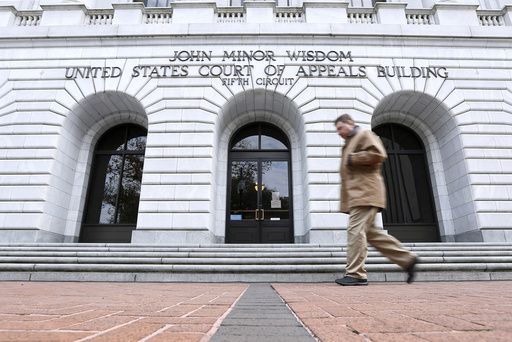Appeal arguments are set on an order limiting Biden administration communications with social media
FILE – A man walks in front of the 5th U.S. Circuit Court of Appeals on Jan. 7, 2015, in New Orleans. Biden administration attorneys are set to ask appellate court judges in New Orleans on Thursday, Aug. 10, 2023, to block a Louisiana-based federal judge’s broad order limiting executive branch officials and agencies’ communications with social media companies about controversial online posts. The 5th Circuit granted a temporary pause on enforcement of the order on July 14, giving both sides time to file briefs and prepare for Thursday’s hearing. (AP Photo/Jonathan Bachman, File)
NEW ORLEANS (AP) — Biden administration attorneys were set to ask appellate court judges in New Orleans on Thursday to block a Louisiana-based federal judge’s broad order limiting executive branch officials and agencies’ communications with social media companies about controversial online posts.
U.S. District Judge Terry Doughty of Monroe issued the order last month in a lawsuit brought by Republican attorneys general in Louisiana and Missouri, who will be asking the 5th U.S. Circuit Court of appeals to uphold the order. Plaintiffs also include a conservative website owner and four individual critics of government COVID-19 policies.
Critics of the ruling say it could hamper attempts to squelch misinformation on topics such as public health and elections. Supporters of the order say it keeps the government from illegally censoring points of view.
The 5th Circuit granted a temporary pause on enforcement of the order on July 14, giving both sides time to file briefs and prepare for Thursday’s hearing. A panel of three judges was scheduled to hear arguments: Edith Brown Clement and Jennifer Walker Elrod, nominated to the court by former President George W. Bush; and Don Willett, nominated by former President Donald Trump.
Filed last year, the lawsuit claimed the administration, in effect, censored free speech by discussing possible regulatory action the government could take while pressuring companies to remove what it deemed misinformation. COVID-19 vaccines, legal issues involving President Joe Biden’s son, Hunter, and election fraud allegations were among the topics spotlighted in the lawsuit.
Doughty, nominated to the federal bench by Trump, issued an Independence Day order and accompanying reasons that covered more than 160 pages. He said the plaintiffs were likely to win the lawsuit. His injunction blocked the Health and Human Services Department, the FBI and multiple other government agencies and administration officials from “encouraging, pressuring, or inducing in any manner the removal, deletion, suppression, or reduction of content containing protected free speech.”
Administration lawyers said the order was overly broad and vague, raising questions about what officials can say in conversations with social media companies or in public statements. They said Doughty’s order posed a threat of “grave” public harm by chilling executive branch efforts to combat online misinformation. And they said there has been no evidence of threats by the administration.
“The district court identified no evidence suggesting that a threat accompanied any request for the removal of content,” the administration said. “Indeed, the order denying the stay — presumably highlighting the ostensibly strongest evidence — referred to ‘a series of public media statements.'”
In response, the attorneys general say in briefs that the order ended an “egregious campaign” by the administration that “fundamentally distorted online discourse in America on great social and political questions.”
The White House has said publicly it disagrees with the ruling but has said little about how and whether it has affected communication with social media companies so far.


